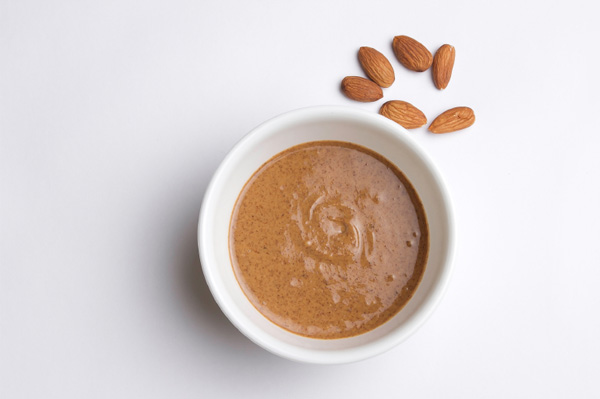With the rise of a health-conscious population, many people are looking for alternatives to the favored unhealthy foods that they enjoy. Many people have turned to almond butter in replacement of other nut butter products, such as peanut butter, as the almond butter benefits far surpass that of peanut butter. Almond butter has low sodium content and pertains heart-healthy fats, making it a great choice for anyone wishing to eat well, the taste is delightful and its versatility is astounding.
Healthy Benefits of Almond Butter
The health benefits of almond butter are overwhelming. One tablespoon of almond butter contains:
- 100 calories
 10 grams fat
10 grams fat- 2 grams protein
- 1 gram fiber
- 10% recommended daily allowance (RDA) of magnesium
- 8% RDA of phosphorous
- 4% RDA of calcium
Some even more excellent almond butter benefits are listed below:
1. Healthy for the Heart
Almond butter is rich in monounsaturated fats, which are the type of fats that reduce levels of cholesterol and decrease the risk of heart ailments.
2. Help to Lower Blood Pressure
Another great almond butter benefit is to lower blood pressure. If cholesterol builds up within blood vessels, then the blood cannot move as freely around the body, meaning that your heart has to work extra hard to pump the blood sufficiently, thus raising your blood pressure. Reducing cholesterol by consuming almond butter can help to prevent this from occurring.
3. Control Blood Sugar
Almond butter can be consumed without worry in regards to increasing blood sugar levels, and it tastes great. It may even help to control blood sugar levels by lessening the increases of blood sugar and insulin within the body which is typical after a carbohydrate-rich meal.
4. Rich in Antioxidants
Antioxidants are extremely beneficial because they nullify the effect of free radicals which do cellular damage to your body, thus help protect cells from oxidative stress and reduce the risk of heart disease and other ailments associated with it.
5. Help Control Weight
As nuts like almonds have high calorie content, many may assume that they should be avoided if you wish to control your weight. In fact, the opposite is actually true. Due to the fiber, monounsaturated fats, and protein within almonds and almond butter, consumption of almond butter benefits weight control, not hinders it.
Are There Any Risks of Almond Butter?
Almonds contain oxalates, which are compounds naturally found in humans, animals, and other foods. If consumed in high amounts, it may cause physical malaises, especially in individuals who have kidney or gall bladder issues (as their body struggles to break down oxalates).
Another risk worth noting is that of allergies. Almonds are a type of nut, which many people may be allergic to. This means that if you are allergic to almonds and eat only a small amount, an adverse reaction may occur. Ensure to be clear in mind whether you have any allergens to nut products before consuming.
Almond Butter vs. Peanut Butter
Round 1: Nutritional Info
Although peanut butter generally has more protein, on average the nutritional values (in terms of calorie, carbohydrate, fat, and fiber content) are typically thereabouts the same.
Winner: Tie.
Round 2: Vitamins and Minerals
Whilst peanut butter has higher values of niacin (22% of RDA) and vitamin B6 (14% of RDA) when compared to almond butter, which contains 5% and 2% respectively, almond butter benefits in containing almost twice the amount of magnesium and iron, and three times as much vitamin E (an antioxidant), four times the calcium content of peanut butter, and six times the riboflavin content.
Winner: Almond Butter.
Round 3: Fat
Almond butter, as mentioned, is packed with health fats that do far more good than harm to your body. Peanut butter, on the other hand, often contains twice as much of Omega-6 fatty acids than almond butter, which are often linked to an increased chance of heart disease.
Winner: Almond Butter.
Round 4: Additives
It is common knowledge that additives such as sweeteners are included in many food products for numerous reasons. When looking at the ingredients list for peanut butter, you may often notice these unwanted additives, such as hydrogenated oil, or corn syrup. That being said, these additives may also be found in almond butter. The best way to avoid unwanted additives is to always buy organic.
Winner: Tie.
The Verdict
By all accounts, both peanut butter and almond butter are dense with nutrients, and if both are bought organically, they can benefit a healthy diet. However, the almond butter benefits outweigh that of peanut butter; therefore if a victor must be ascertained, almond butter is crowned victorious.
